How To Build A Strong Case For A Facebook Mental Health Lawsuit
- Last Updated: December 16th, 2025
Key Takeaways
Gather solid evidence like detailed usage records, changes in mental health, and any harmful content or interactions on Facebook.
Consult with an attorney specializing in technology and social media law to navigate complex Internet regulations and consumer protection laws.
Documenting your experience on Facebook is key due to Meta's designs that can lead to addiction and damaging self-esteem among teens.
How to Build a Strong Case for a Facebook Mental Health Lawsuit?
On this page, we’ll provide an overview of the Facebook Mental Health Lawsuit, issues surrounding social media platforms’ effect on mental health, legal actions taken by plaintiffs in the Facebook mental health lawsuit, and much more.
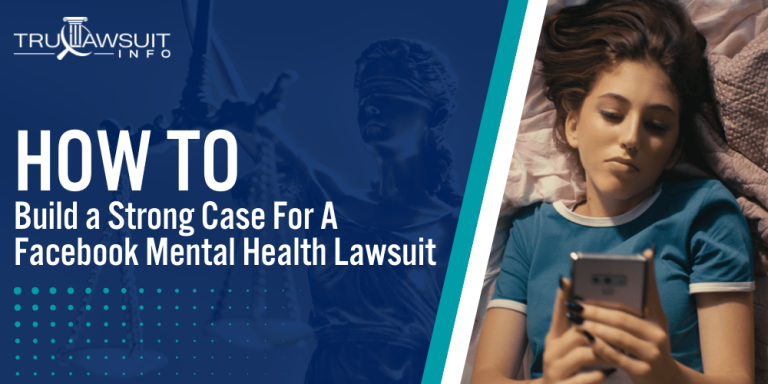
Intro to the Facebook Mental Health Lawsuits
The legal proceedings known as the Facebook Mental Health Lawsuits have set a precedent in examining social media companies‘ influence on users, especially the younger demographic.
At the heart of these cases is the allegation that Facebook, now known as Meta, devised platform algorithms and features that not only foster addiction but have also contributed to a rise in teen mental health crises.
The key allegations in the Facebook mental health lawsuits include, but are not limited to:
- Algorithms geared to keep users engaged longer
- Features that promote excessive use, particularly among youths
- Creation of content likely to lead to addictive behavior
- Inadequate measures to protect user well-being
If you or a loved one has experienced adverse mental health effects due to excessive social media usage, you may qualify to file for compensation.
Contact TruLawsuit Info using the chat on this page to receive an instant case evaluation to discover if you are eligible for the facebook mental health lawsuit.
Facebook Mental Health Lawsuit: Impact on Youth Mental Health
Meta’s Contributions to the Youth Mental Health Crisis
In today’s digital age, the influence of technology companies on our daily lives has become a major topic of concern.
As a result, there is a growing focus on the mental health of young people, with a particular emphasis on how it intersects with the activities of these tech companies.
The focus on young people’s mental health reflects growing concerns about the intersection of tech companies and societal well-being.
A growing body of research suggests a concerning link between social media use and mental health issues in young people:
- Increased Reports: Studies reveal a rise in mental health challenges like anxiety and depression among youth who heavily engage with social media platforms.
- Vulnerable Population: Young people are particularly susceptible to social media’s negative influences due to factors like heightened self-consciousness and social comparison.
- Legal Recognition: The legal actions against TikTok acknowledge the potential widespread harm to this vulnerable population.
- Industry Action Needed: These lawsuits serve as a wake-up call for the tech industry, urging them to prioritize user mental health and implement safeguards to protect young users.Facebook’s Impact on Mental Health
The lawsuits brought against Facebook have cast a spotlight on the complex relationship between social media and mental health, particularly among young users.
This section examines the evidence and concerns raised regarding the platform’s influence on psychological well-being.
Research Findings on Social Media and Mental Health
Various studies have detailed the association between social media usage and mental health.
Key findings from the research have identified several trends:
- Extended use of social media is often linked with heightened levels of anxiety and depression.
- Users may experience lower self-esteem, particularly when comparing their lives to those of peers on social media.
- A notable correlation exists between social media and the development of body image issues.
- The pressure to maintain a certain persona online can lead to emotional distress.
Social Media and Youth Mental Health Crisis
Social media is raising concerns about children’s mental health.
Cyberbullying is a significant issue, along with peer pressure and stress.
Excessive social media use disrupts sleep patterns and affects users’ perceptions of self and others.
Concerns about the effects of social media on children’s mental health are growing, with particular focus on:
- The increased risk of cyberbullying and its subsequent impact on a child’s well-being.
- Social media acts as a conduit for peer pressure, intensifying stress and anxiety.
- The impact of social media on sleep patterns, as excessive use, especially before bed, can disrupt sleep.
- Difficulty in separating social media from reality can affect young users’ perception of self and others.
Evidence from the Facebook Whistleblower
A Facebook whistleblower’s testimony revealed concerning aspects of the platform’s practices.
Internal documents show Facebook’s awareness of negative mental health effects, prioritization of growth over users’ well-being, and algorithms intensifying exposure to harmful content.
Reports suggest inadequate measures to address these issues contribute to the spread of toxic content affecting users’ mental health.
The testimony of a Facebook whistleblower has provided unsettling insights into the platform’s practices:
- Internal documents indicate Facebook’s awareness of the negative mental health effects, particularly on teenagers.
- Evidence suggests that the platform prioritized growth over users’ well-being, especially concerning children and teens.
- An acknowledgment of algorithms that intensified exposure to harmful content related to eating disorders and depression.
- Reports of inadequate measures to address known issues contribute to the spread of toxic content affecting users’ mental health.
Legal Grounds of the Facebook Mental Health Lawsuit
The Facebook Mental Health Lawsuit is a pivotal legal case that highlights the intersection of technology and poor mental health.
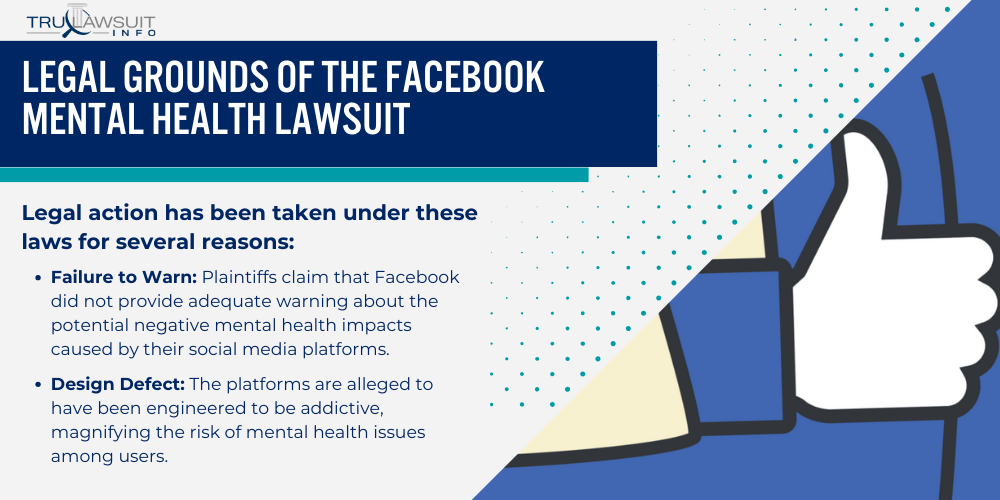
The lawsuit accuses Facebook of violating consumer protection laws and creating a public health hazard.
Consumer Protection Laws Invoked
The legal challenge to Facebook hinges on consumer protection laws, which are designed to safeguard individuals against unethical practices and products that could harm the public.
Legal action has been taken under these laws for several reasons:
- Failure to Warn: Plaintiffs claim that Facebook did not provide adequate warning about the potential negative mental health impacts caused by their social media platforms.
- Design Defect: The platforms are alleged to have been engineered to be addictive, magnifying the risk of mental health issues among users.
- Deceptive Practices: The company is accused of misrepresenting the safety of its platforms and the impact on users’ well-being.
- Negligence: Facebook may have neglected the duty of care to its users, particularly vulnerable populations such as minors.
California Superior Court’s Role
The California Superior Court has a critical role in this high-profile lawsuit.
It will determine if Facebook violated consumer protection laws, assess claims of negligence and harm, oversee discovery, hear motions, conduct the trial, and issue a verdict to decide if Facebook is responsible for the alleged damages.
The California Superior Court serves as the battleground for this high-profile lawsuit, with the following critical functions undertaken:
- Assessing the Complaint: The court is responsible for evaluating the legal basis of the claim that Facebook’s actions or inactions violated consumer protection laws.
- Determining the Merit: It must determine whether sufficient evidence exists to support the allegations of negligence and harm.
- Overseeing Discovery: This phase allows both parties to gather evidence to bolster their case, an essential step in this complex legal challenge.
- Hearing Motions: Before proceeding to trial, the court will address motions which may include efforts to dismiss the case or requests for summary judgment.
- Conducting the Trial: If the case proceeds past preliminary hearings and motions, the court will oversee the presentation of arguments, witness testimony, and evidence from both parties.
- Issuing a Verdict: If the case goes to trial, the court will decide whether Facebook violated consumer protection statutes and is responsible for the alleged damages.
The Role of Tech Companies in the Facebook Mental Health Lawsuit
The Facebook lawsuit has cast a spotlight on the responsibilities and practices of tech companies, particularly regarding their influence on the mental health of younger users.
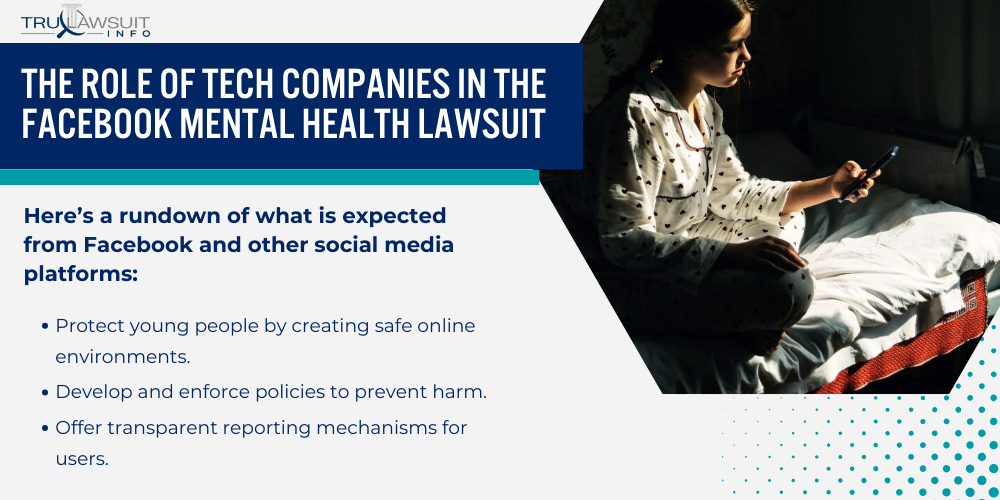
Responsibilities of Social Media Platforms
Social media platforms hold a significant degree of responsibility for how their products impact users.
Here’s a rundown of what is expected from Facebook and other social media platforms:
- Protect young people by creating safe online environments.
- Develop and enforce policies to prevent harm.
- Offer transparent reporting mechanisms for users.
- Provide resources and support for mental health concerns.
- Ensure that user experience does not prioritize corporate profits over well-being.
- Actively work to understand the impact of their services on youth mental health.
Allegations of Negligence by Meta
Meta Platforms Inc., Facebook’s parent company, has been accused of handling user safety and mental health issues.
Specific points of concern include:
- The company’s internal research indicating potential harm to young users was allegedly downplayed.
- Features that could attract and addict children are at the center of the lawsuit for not being addressed adequately.
- A failure to implement changes that would lessen the potential for harm has led to calls to make companies accountable.
- The settlement proposals indicate a recognition of the need for corporate responsibility in the tech industry.
Plaintiff Testimonies and Case Studies: Facebook Mental Health Lawsuit
In examining the Facebook Mental Health Lawsuit, it becomes apparent that families and school districts are vocal about the purported negative impacts of social media on youth mental health.
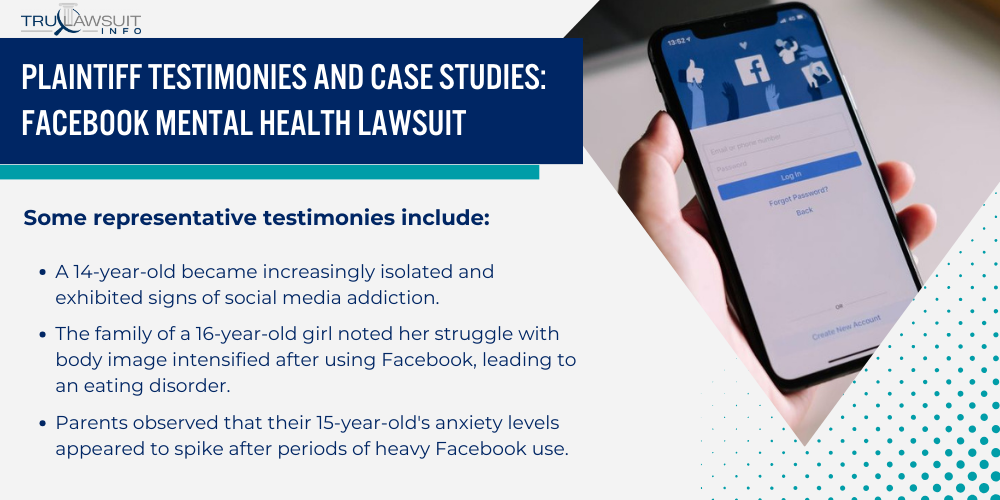
Stories from Affected Families
Affected families have raised concerns about the significant mental health issues stemming from the use of Facebook by teenagers.
These issues include, but are not limited to, addiction, depression, and anxiety.
Some representative testimonies include:
- A 14-year-old became increasingly isolated and exhibited signs of social media addiction.
- The family of a 16-year-old girl noted her struggle with body image intensified after using Facebook, leading to an eating disorder.
- Parents observed that their 15-year-old’s anxiety levels appeared to spike after periods of heavy Facebook use.
- Reports of disturbed sleep patterns and decreased real-world social interactions among numerous teens.
These narratives align with allegations that Meta’s algorithms potentially prioritize addictive content, exacerbating these issues.
School Districts’ Experiences
Multiple school districts have stepped forward with their experiences, adding weight to the class action against Meta.
The administrators have noted a range of mental health impacts, including:
- A noticeable uptick in student counseling visits for social media-related anxiety.
- Increased instances of cyberbullying correlated with the rise of Facebook usage.
- Schools face challenges in addressing social media-induced attention deficits during class.
- Districts investing in digital literacy programs to mitigate the harmful effects of Facebook on students.
Government and Public Response to the Facebook Mental Health Lawsuit
The legal actions initiated by over 40 states’ attorneys general represent a significant government response to the ongoing crisis in youth mental health attributed to social media platforms like Facebook.
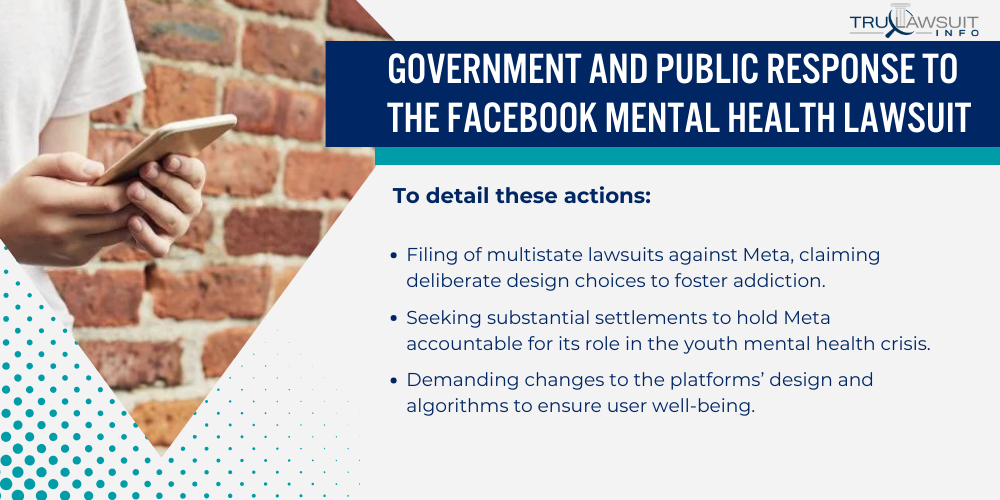
Actions by Attorneys General
A coalition has emerged, with attorneys general across the United States taking decisive legal steps to protect users, particularly minors, from the effects of social media on mental health.
To detail these actions:
- Filing of multistate lawsuits against Meta, claiming deliberate design choices to foster addiction.
- Seeking substantial settlements to hold Meta accountable for its role in the youth mental health crisis.
- Demanding changes to the platforms’ design and algorithms to ensure user well-being.
- Advocating for transparency from Meta regarding its internal research on social media’s effects on mental health.
- Introducing legislation aimed at enhancing online consumer protection.
- Launching inquiries into Meta’s practices to uncover how they affect young users.
Public support has been growing for the attorneys general’s legal actions, emphasizing the need for systemic changes to social media practices.
Public Health and Wellbeing Initiatives
The lawsuit’s implications have catalyzed various public health and wellbeing initiatives.
Here is how different sectors are responding:
- Educational campaigns to inform about the potential mental health risks associated with social media use.
- Support groups and resources becoming more available for families and individuals affected by social media-related mental health concerns.
- Research organizations intensifying the study of social media’s impact on mental health.
- School and community programs are being developed to promote digital literacy and responsible social media use.
The responses from both the government and public sectors indicate a growing acknowledgment of the importance of mental health in the digital age and a commitment to addressing the challenges posed by social media platforms.
Strategies for Protecting Young Users
Ensuring the well-being of young users online requires a concerted effort to enforce age-appropriate standards and foster positive online experiences.
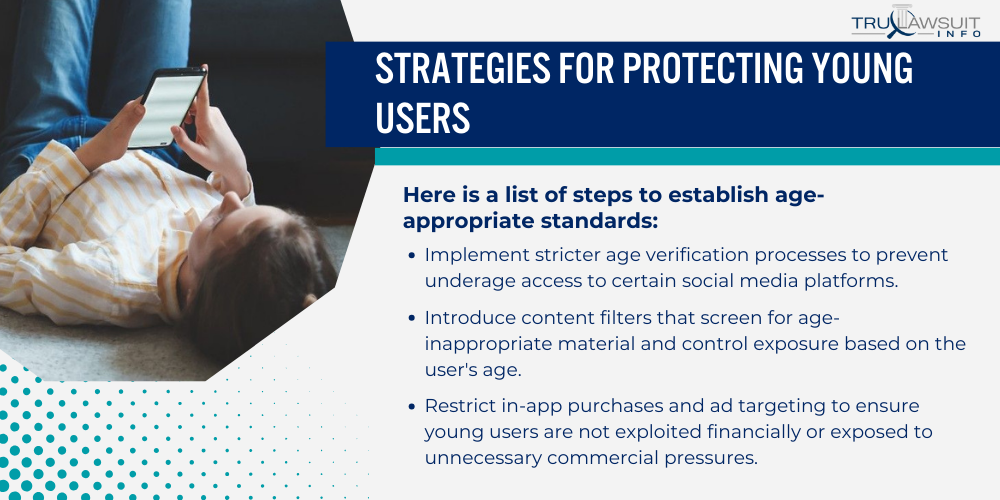
These strategies can help mitigate potential issues stemming from social media’s influence on youth mental health.
Creating Age-Appropriate Standards
To tailor social media use to be suitable for youths, there are key steps that companies and communities can take.
Here is a list of steps to establish age-appropriate standards:
- Implement stricter age verification processes to prevent underage access to certain social media platforms.
- Introduce content filters that screen for age-inappropriate material and control exposure based on the user’s age.
- Restrict in-app purchases and ad targeting to ensure young users are not exploited financially or exposed to unnecessary commercial pressures.
- Develop time management tools in apps that allow both users and guardians to set healthy usage limits.
- Offer educational content that promotes digital literacy and helps young users recognize and deal with online risks.
- Collaborate with child development experts to regularly update and refine age-related guidelines.
Encouraging Positive Online Experiences
To improve the mental health outcomes for young users on social media, platform designers must consider ways to enhance positive interactions.
Consider the following tactics to encourage positive online experiences:
- Promote community guidelines that encourage respectful and supportive interactions and clearly define the consequences of cyberbullying.
- Highlight positive content through algorithms that prioritize educational, inspiring, and uplifting material.
- Encourage users to take breaks from the platform with reminder notifications, discouraging compulsive use.
- Provide in-app resources for mental health support, including access to hotlines or chat support for users in distress.
- Incorporate user feedback to continually improve the online environment and ensure it remains a safe space for all age groups.
- Ensure transparent communication about how user data is used, building trust and providing users with control over their digital footprint.
Social Media Addiction and its Effects
The prevalence of social media addiction is increasingly concerning as excessive social media use garners legal attention.
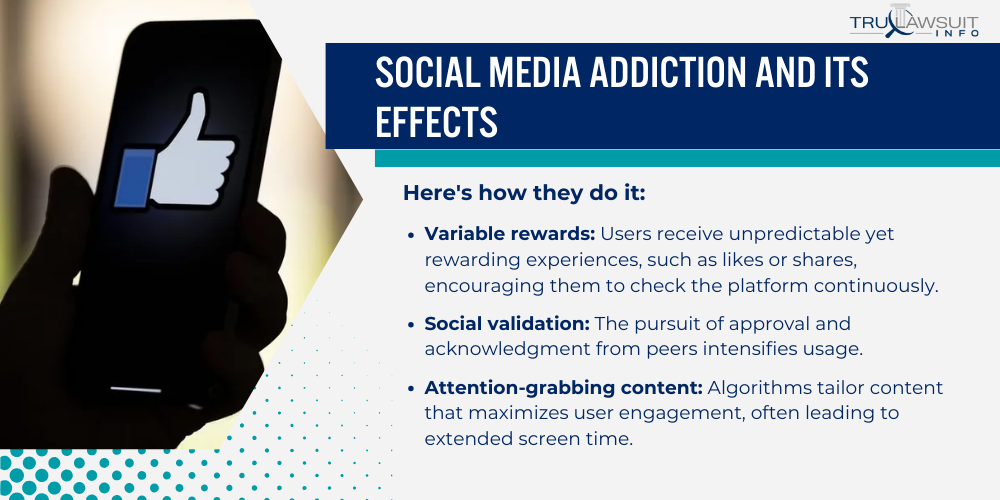
This section explores the intricacies of addiction mechanics and their profound impacts on young adults and college students.
Mechanics of Social Media Addiction
Social media platforms are designed to exploit psychological principles, contributing to addictive behaviors.
Here’s how they do it:
- Variable rewards: Users receive unpredictable yet rewarding experiences, such as likes or shares, encouraging them to check the platform continuously.
- Social validation: The pursuit of approval and acknowledgment from peers intensifies usage.
- Attention-grabbing content: Algorithms tailor content that maximizes user engagement, often leading to extended screen time.
- Fear of missing out (FOMO): Continuous updates and notifications evoke anxiety over being left out, prompting frequent log-ins.
Impact on Teenagers and Young Adults
Social media addiction in younger demographics can disrupt academic performance, cause depression, anxiety, and loneliness, and lead to sleep disturbances.
Real-life relationships may also deteriorate as online interactions take precedence.
The effects of social media addiction on younger demographics manifest in various concerning ways:
- Academic performance: Excessive use can disrupt focus and lower student academic achievement.
- Mental health: There’s a link between high social media usage and increased rates of depression, anxiety, and loneliness.
- Sleep disturbances: Engaging with social media late into the night can result in insomnia and poor sleep quality.
- Interpersonal relationships: Real-life connections may deteriorate due to the prioritization of online interactions.
Future Implications of the Facebook Mental Health Lawsuit
The Facebook mental health lawsuit brings critical issues to the forefront, with the potential to reshape social media platforms and strengthen protective measures for users, especially the young and vulnerable.
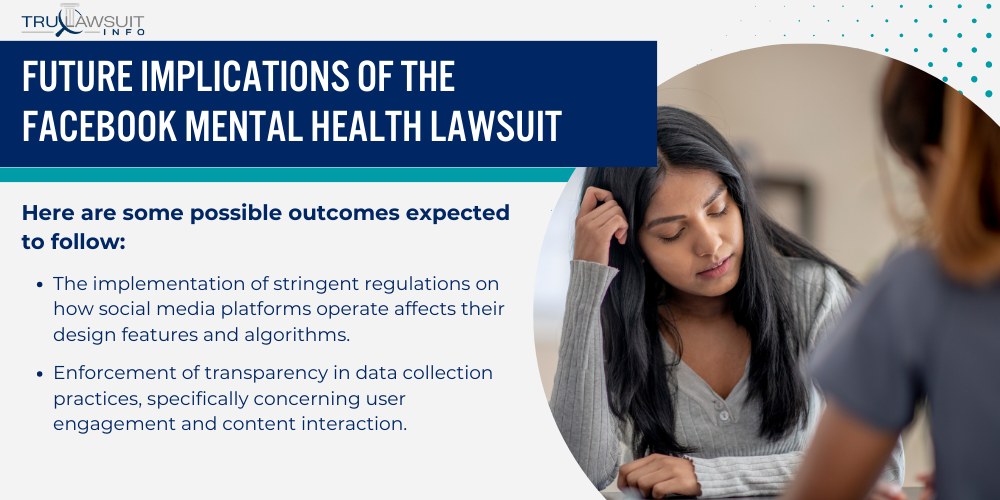
Potential for Industry-wide Change
The lawsuit could catalyze industry-wide change, inciting a reevaluation of ethical responsibilities.
Here are some possible outcomes expected to follow:
- The implementation of stringent regulations on how social media platforms operate affects their design features and algorithms.
- Enforcement of transparency in data collection practices, specifically concerning user engagement and content interaction.
- Development of new policies to limit the negative influence of harmful content, thereby safeguarding users’ mental health.
- Introduction of age verification systems to more reliably protect young people from age-inappropriate content.
Support Systems for Vulnerable Users
Legal action could lead to better support systems for vulnerable users.
This includes education programs, resources to mitigate harm, and collaborations with mental health organizations.
Research into the long-term effects of social media usage can provide a data-backed foundation for future initiatives.
The legal action could lead to the establishment of robust support systems for vulnerable users. Here’s how:
- Establishment of education programs to inform users about the impact of social media on mental health.
- Creation of resources and tools to identify and mitigate potential harm caused by online platforms.
- Support for research into the long-term effects of social media usage, providing a data-backed foundation for future initiatives.
- Collaborations with mental health organizations to offer direct support to users, particularly to support teens struggling with mental health issues as a result of social media use.
Frequently Asked Questions
-
Recent reports have emerged indicating that Meta, the parent company of popular social media platforms, is currently entangled in legal proceedings due to allegations that its platforms have worsened mental health issues among its users.
It’s important for companies to prioritize the well-being of their users and address any concerns related to mental health.
-
Legal actions against Meta are underpinned by accusations that the company’s social media algorithms were intentionally designed to be addictive.
Litigants assert that such designs have led to an increase in social media addiction and consequent mental health issues.
-
There is a growing consensus among legal experts that social media platforms may be held accountable for negative impacts on users’ mental health.
The Attorney provides a perspective on social media companies’ responsibility.
-
Meta’s legal team has been actively addressing the claims.
However, the specifics of their defense strategy remain closely guarded.
Updates from TruLawsuit Info and news reports can provide regular updates on the proceedings.

Attorney Jessie Paluch, founder of TruLawsuit Info, has over 25 years of experience as a personal injury and mass tort attorney, and previously worked as an international tax attorney at Deloitte. Jessie collaborates with attorneys nationwide — enabling her to share reliable, up-to-date legal information with our readers.
Legally Reviewed
This article has been written and reviewed for legal accuracy and clarity by the team of writers and legal experts at TruLawsuit Info and is as accurate as possible. This content should not be taken as legal advice from an attorney. If you would like to learn more about our owner and experienced injury lawyer, Jessie Paluch, you can do so here.
Fact-Checked
TruLawsuit Info does everything possible to make sure the information in this article is up to date and accurate. If you need specific legal advice about your case, contact our team by using the chat on the bottom of this page. This article should not be taken as advice from an attorney.
You can learn more about the Social Media Harm Lawsuit by visiting any of our pages listed below:
Here, at Tru Lawsuit Info, we’re committed to helping victims get the justice they deserve.
To do this, we actively work to connect them with attorneys who are experts in litigating cases similar to theirs.
Table of Contents
Tru Lawsuit Info is a reliable source of information about issues that may affect your health and safety, such as faulty products, data breaches, and environmental hazards.
Our team of experienced writers collaborates with medical professionals, lawyers, and advocates to produce informative articles, guides, and other resources that raise awareness of these topics.
Our thorough research provides consumers with access to reliable information and updates on lawsuits happening around the country. We also can connect consumers with attorneys if they need assistance.
Here, at Tru Lawsuit Info, we’re committed to helping victims get the justice they deserve.
To do this, we actively work to connect them with attorneys who are experts in litigating cases similar to theirs.
